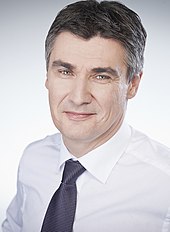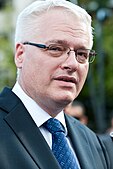President of the Republic of Croatia
| President of the Republic of Croatia | |

|
|
| Standard of the President | |

|
|
|
Acting President Zoran Milanović since February 18, 2020 |
|
| Official seat | Presidential Palace in Zagreb |
| Term of office | 5 years (re-election possible once) |
| Creation of office | December 22, 1990 |
| Last choice | December 22, 2019 and January 5, 2020 |
| website | www.predsjednik.hr |
The President of the Republic of Croatia ( Croatian Predsjednik Republike Hrvatske ) is the head of state of the south-eastern European state of Croatia . The current president is Zoran Milanović .
Constitutional position
According to the Constitution of the Republic of Croatia, the President is the head of the state. He represents and embodies the republic at home and abroad. It also ensures the orderly and harmonious functioning and stability of state authority. He is also responsible for the defense of independence and the territorial unity of the Republic of Croatia.
Competencies
The President has the following powers and duties:
- writes out the elections for the Sabor and calls it for the first meeting
- assigns a person to form a government who, according to the distribution of seats in the Sabor, has the opportunity to gain the trust of the majority of its members through negotiations
- speaks pardons from
- gives awards and recognitions
- works with the government to formulate and execute foreign policy
- at the request of the government and with the countersignature of the Prime Minister, decides on the establishment of diplomatic and consular missions abroad
- appoints and dismisses diplomatic representatives at the proposal of the government and with the approval of the competent committee of the Sabor with the prior countersignature of the prime minister
- the credentials and letters of recall takes foreign diplomats to
- is commander in chief of the armed forces
- appoints and dismisses in accordance with the law , the military commander
- can issue ordinances with the force of law during a state of war if the Sabor grants him authorization to do so
- may propose that the government hold a meeting and deal with certain matters
- can attend the meetings of the government and participate in the deliberations
- works with the government to direct the operations of the intelligence agency
- at the request of the Government and with the countersignature of the Prime Minister after consultation with the representatives of the factions of the parliamentary parties to resolve the Sabor when the government's distrust pronounce or 120 days from the day of submission to the state budget does not accept
- cannot dissolve the Sabor on a government proposal if he is under impeachment proceedings
choice
The President is elected by direct election for a term of five years. The basis for this is universal and equal suffrage. Re-election is only permitted for a further term of office. The election must take place at least 30 and at most 60 days before the expiry of the current president's term of office.
The candidate for the office of president is elected with an absolute majority of all votes cast.
If none of the candidates receives the required majority, a second ballot ( runoff ) will take place in 14 days . Those two candidates who received the most votes in the first election will be put into the runoff election. If a candidate renounces the runoff vote, the next candidate according to the number of votes received has the right to run the runoff election.
Representation and resignation
Should the President temporarily not be able to exercise his office due to absenteeism, illness or annual leave of absence, the President of Parliament will take over for him.
If the President is unable to exercise his official duties for a longer period due to illness or inability, and if he is also unable to decide to entrust his official duties to the provisional representative, the President of Parliament shall temporarily exercise the official duties of the President in accordance with a decision of the Constitutional Court . The constitutional court decides on the proposal of the government.
In the event of death or resignation , which must be notified to the President of the Constitutional Court and the Speaker of Parliament, or if the Constitutional Court decides on the reasons for the termination of the President's mandate, the President's duties are also temporarily assumed by the President of Parliament. New elections must then be held no later than 60 days from the day on which the previous president ended his office.
Accountability and Impeachment
The President is responsible for violations of the Constitution in the exercise of his office.
The Sabor can initiate the procedure to determine the particular responsibility with a two-thirds majority of all MPs. The constitutional court then decides on the responsibility of the president within 30 days, also with a two-thirds majority of all judges . Should the Constitutional Court find responsibility, then the President is relieved of his office.
immunity
Without the prior consent of the Constitutional Court , the President cannot be arrested, nor can criminal proceedings be initiated against him. He can only be detained without the approval of the Constitutional Court if he was found committing a crime for which a prison sentence of more than five years is prescribed. In such a case, the state body that detained the President of the Republic shall immediately notify the President of the Constitutional Court.
Croatian presidents since 1990
| # | Surname
(Life data) |
Political party* | Taking office | Term expires | annotation | image |
|---|---|---|---|---|---|---|
| 1 |
Franjo Tuđman
(May 14, 1922 - December 10, 1999) |
HDZ | May 30, 1990 | December 10, 1999 | Election 1992, 1997 | |
| - | Vlatko Pavletic | HDZ | December 10, 1999 | February 2, 2000 | interim
(President of the Sabor ) |
|
| - | Zlatko Tomčić | HSS | February 2, 2000 | February 18, 2000 | interim
(President of the Sabor) |
|
| 2 |
Stjepan Mesic
(* December 24, 1934) |
independent | February 18, 2000 | February 18, 2010 | Election 2000, | |
| 3 |
Ivo Josipović
(* August 28, 1957) |
independent | February 18, 2010 | February 15, 2015 | Election 2009/10 | |
| 4th |
Kolinda Grabar-Kitarović
(* April 29, 1968) |
independent | February 15, 2015 | February 18, 2020 | Election 2014/15 | |
| 5 |
Zoran Milanović
(* October 30, 1966) |
independent | February 18, 2020 | officiating | Election 2019/20 |
* Since 2000, Croatian presidents have not been legally allowed to belong to any political party.
See also
Web links
- Official website of the President of Croatia (Croatian, English)
- German language edition of the Constitution of the Republic of Croatia from 1990 www.verfassungen.eu
Individual evidence
- ^ Predsjednici RH. Retrieved May 26, 2020 (Croatian).





